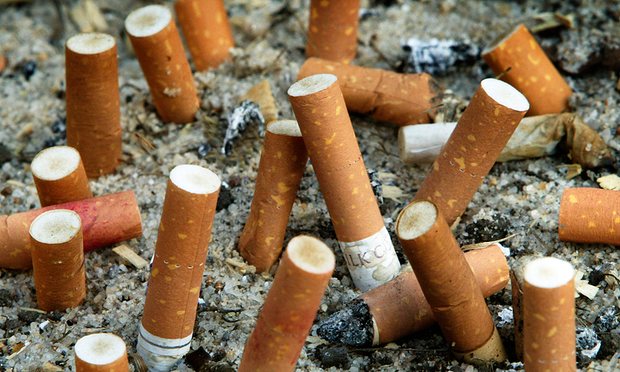DNA study lays bare devastating damage caused by smoking
People who smoke a pack of cigarettes each day for a year develop on average 150 extra mutations in every lung cell, and nearly 100 more mutations than usual in each cell of the voice box, researchers found. More still build up in the mouth, bladder, liver and other organs.
More than 70 of the 7,000 chemicals found in tobacco smoke are known to cause cancer. Some damage DNA directly, but others ramp up mutations in more subtle ways, often by disrupting the way cells function. The more mutations a cell acquires, the more likely it is to turn cancerous.
The reason why some people can smoke for years without getting cancer, while others develop the disease, is down to the way mutations arise. When a person smokes, the chemicals they inhale create mutations at random points in the genome. Many of these changes will be harmless, but others not so benign. The more smoke a person is exposed to, the greater the chance that the accumulating mutations will hit specific spots in the DNA that turn cells cancerous.
 |
| While chemicals in tobacco smoke are known to raise the risk of cancer, the precise molecular mechanisms through which they mutate DNA and give rise to tumours have never been clear. Photo: : Murdo Macleod for the Guardian |
With researchers at the Wellcome Trust’s Sanger Institute near Cambridge and others, Alexandrov analysed the DNA of more than 5,000 cancers. The team then turned to pattern recognition software to tease apart the various mutational signatures found in tumours from smokers versus non-smokers. To find the signatures - the patterns of mutations present in cancer cells - researchers performed the genetic equivalent of recording the chatter at a party and then extracting individual conversations from the hubbub.
The scientists spotted more than 20 mutational signatures in 13 types of cancer linked to tobacco smoking. But only five of these were more common in smokers’ tumours. One pattern of mutations, dubbed signature four, was found to be a major driver for lung cancer. It is thought to be caused by benzopyrene, a chemical found in tobacco smoke.
More intriguing was how tobacco caused mutations in tissues that are not directly exposed to smoke, such as the bladder, kidneys and pancreas. The study found that chemicals from tobacco smoke found their way to different organs and tissues and then sped up the molecular clocks in the cells. This ramped up the natural rate at which mutations built up in the tissues.
“We knew there was direct damage from smoking in the lungs. What we didn’t expect was to see smoking speed up the molecular clocks inside cells,” said Alexandrov, whose study appears in the journal Science. “In bladder cancer, the only thing that causes the extra mutations in smokers is the speeding up of the clock, and that will be very dependent on the intensity of smoking. For every pack of cigarettes you smoke per year, you accumulate 18 mutations in all of your bladder cells,” he added.
Scientists hope that by understanding how the individual ingredients of tobacco smoke raise the risk of various cancers, they can develop new ways to prevent the disease. The same techniques used in the latest study will now be used to tease apart how alcohol, obesity and other factors also increase a person’s cancer risk.
“There is a message here for people who are occasional or social smokers who think it doesn’t do anything,” said Alexandrov. “If you smoke four to five packs of cigarettes in your lifetime it doesn’t sound that much, but you still get several mutations in every cell in your lungs and these are permanent, they do not go away. There are a lot of things that do revert back when you stop smoking, and this shouldn’t discourage people from giving up, but the specific mutations in the lung cells are like scars. If you stop smoking, they’ll still be there.”

